
Chuck Blazer, the American General Secretary of CONCACAF, announced he is leaving his post at the end of the year, but will remain on FIFA’s Executive Committee. Blazer, 65, has been milking football for his personal profit and pleasure under the tutelage of CONCACAF and FIFA godfather Jack Warner for two decades. In the build up to the FIFA presidential election earlier in the year, Blazer blew the whistle on a cash-for-votes scheme that led to Blatter being reelected unopposed.
In August, it was also revealed that Blazer was under FBI investigation for tax evasion. Investigative reporter Andrew Jennings — the bane of FIFA crooks’ existence — has written about Blazer’s world of offshore accounts and football-funded lavish lifestyle. “His confidential contract reveals that he hires himself out from his Cayman-based company Sportvertising,” Jennings writes. “It also reveals that he pockets 10% in ‘commissions’ from regional football marketing deals. Last year he picked up nearly $2 million and over the last five years has taken $9.6 million. The sums are recorded in Concacaf accounts – which are not made public – under the heading of ‘Commissions’ – but with no indication he received them.”
A former CONCACAF employee in New York blogged in May about going out with Blazer to strip clubs in Manhattan. The General Secretary treated himself and his staff to “food, strippers, dancers, and massages” paid with “an American Express Card, with CONCACAF and Blazer’s name on it. [. . .] That’s what the General Secretary and Treasurer of CONCACAF, the FIFA Executive from North America, spent the region’s money on . . . regularly,” wrote Mel Brennan.
For Sunil Gulati, US Soccer president, however, “Chuck’s contributions to the sport over the last 30 years are unparalleled. All of us in Concacaf owe him a great debt of gratitude for his sustained efforts in helping to take the sport to where it is today. There is no doubt that he will continue to make an impact in whatever role he chooses.” For the good of the game: the saga continues.
Category: Players
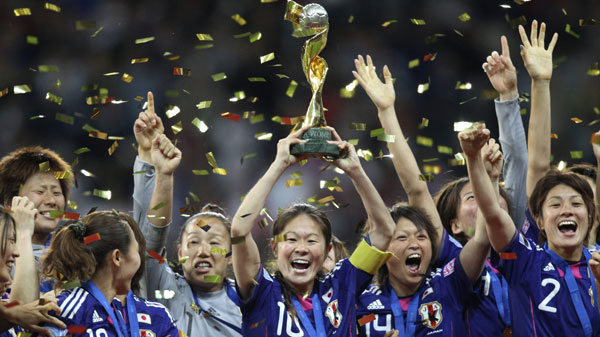
Congratulations to Japan for being crowned World Champions. But the USA really threw this one away. Squandered chances (especially in the first half), shocking defensive errors in the clutch, dubious coaching decisions, and poor penalty shooting left many of us embittered at the end of the night. Still, Sawa’s goal in the 117th minute was pure genius. A perfect symbol of the skill, movement, and self-belief of the Japanese side. Maybe Marta won’t be named FIFA Player of the Year in 2011!
Watch highlights here.
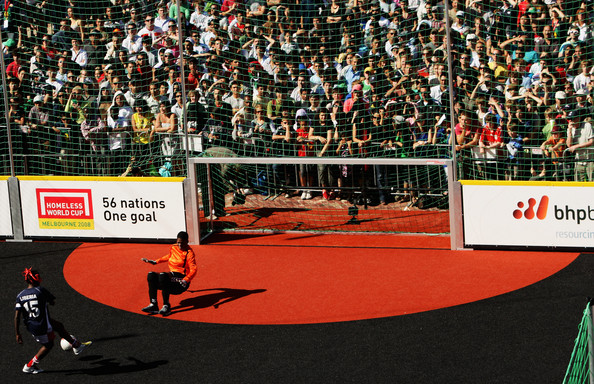
With the Homeless World Cup about to start, Inês Santinhos Gonçalves of Street News Service looks at the power of a ball to create change. Does football have the power to lift those at the bottom out of poverty, or even make them rich? Includes interviews with David Goldblatt, Jonathan Magee, and me.
Read full article here.
Mentalità Americana
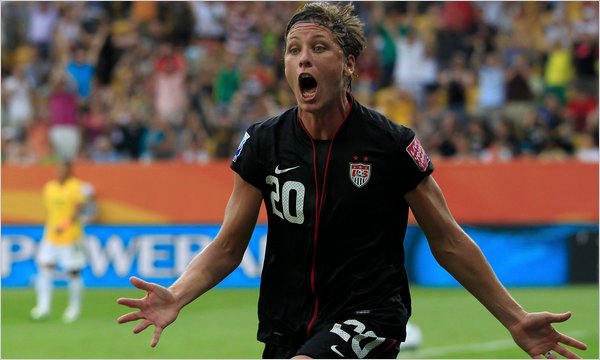
So nobody here in Italy gives a hoot about the Women’s World Cup.
None of the three sport dailies have given the tournament any decent coverage, little more than scores and a sidebar while the rest of the paper is devoted to summer serie A pre-season gossip, Formula 1 profiles, and lame lifestyle pieces. The WWC games are shown on satellite only, with no substantial highlights on TV despite the fact that this football-mad nation has nothing other than dull (so far) Copa America in the middle of the night to keep millions entertained.
Due to Apple’s lack of cooperation with Adobe (makers of flash player used by fifa’s web site), I resorted to following the USA-Brazil on Espn gamecast . . . here we were, the whole family at the dinner table crowded around an iPad waiting breathlessly for the next line of text to narrate what was happening on the pitch.
Decoding the intensity of the events, the odd calls, cautions and ejections, it was all very strange, but captivating. In a 1930s kind of way, when crowds used to gather in the streets and piazzas to hear a guy read out updates sent by telegraph.
Wambach’s goal had us leaping out of our seats, chicken, tomatoes, buffalo mozzarella, and peppers flying around like it was Carnival! The PKs were a bit challenging to follow since no text appeared until the last couple of penalties.
As dessert beckoned, the final score read USA – Brazil 5-3 — actually 2-2 (5-3). Youtube generously and quickly provided the highlights a few minutes ago. Thank goodness for the internet. And praise be to football.
Detroit River Derby
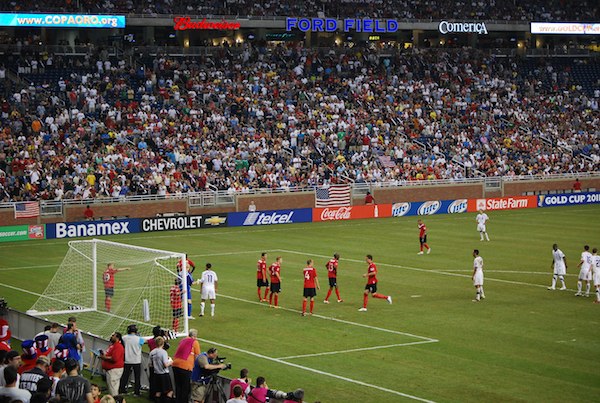
Having witnessed the USA’s last victory in November against South Africa in Cape Town, our 9-year-old daughters proved themselves lucky talismans for the Americans again on Tuesday (a school night!) against Canada in a Gold Cup match at Ford Field in Detroit.
It was my first football match indoors. Ford Field’s warehouse ambience infused the Detroit River derby with a blue-collar chic feel. We welcomed the oddly pleasant sensation of walking into an air-conditioned stadium on a scorchingly hot and humid afternoon.
We arrived early enough to watch Panama – Guadeloupe with a few thousand hard core aficionados. The heavily favored Panamanians scored twice (’29 and ’32) before Guadeloupe’s Tacalfred got a straight red for a rather innocuous foul on Luis Henríquez. Reduced to ten men, the Gwada Boys came to life as the game got chippy.
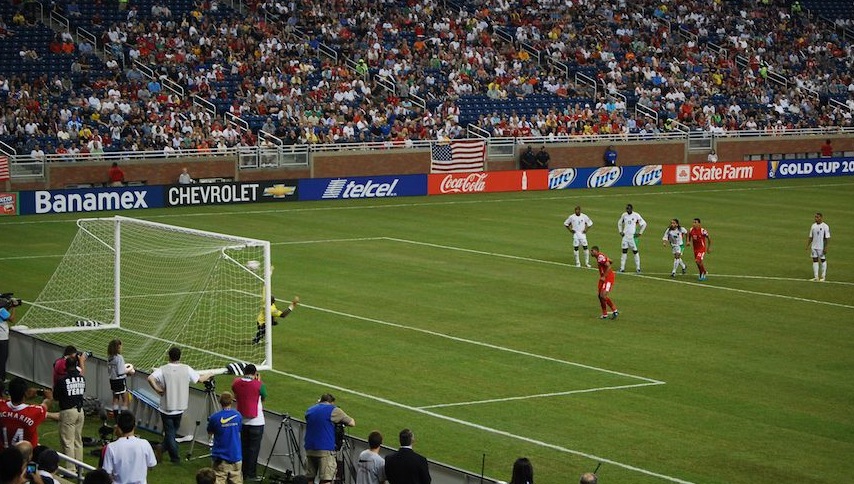
Panama’s third goal — an authoritative penalty by Gomez — seemed to bury the game a few minutes into the second half. (The PK was actually taken twice. Gomez “spooned” the first one into the net.) Content and over-confident, Panama switched off. Guadeloupe fought back. Substitute striker Jovial poached two well-taken goals to make the closing moments tense and exciting. Final score: 3-2 Panama.
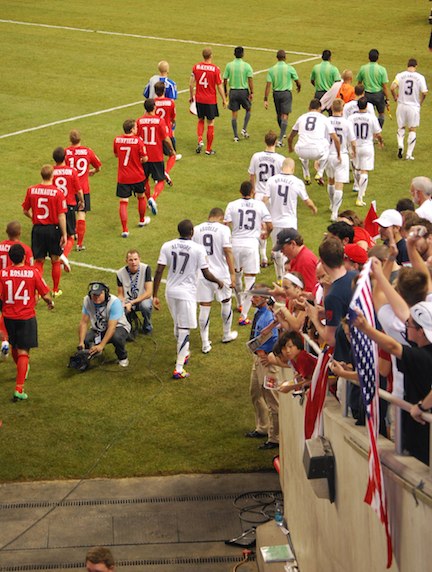
The ritual procession of the USA and Canada out of the tunnel three rows below us midwifed a roar from the crowd of 28,000. “O Canada, we stand on guard for thee,” sang a few hundred Canadian ultras in the North End. Sam’s Army in the South End led the home fans in a spirited response: “And the rockets’ red glare, the bombs bursting in air, gave proof through the night that our flag was still there.” Are we ready to rumble?
Canada sat back on defense, hoping to spring counterattacks. FIfteen minutes in, Lars Hirschfeld’s comical goalkeeping error on Altidore’s simple shot from a tight angle gifted the US the lead. Despite a lot of huffing and puffing on Ford Field’s soft and slightly unstable grass surface, Canada hardly threatened. 1-0 at the break. Our daughters devoted themselves to their new pastimes: Anna, wearing her Messi Barca jersey, went autograph hunting among the Panamanian squad members seated right behind us; Sophie, clad in a Mia Hamm number 9 shirt, snapped photos.
One of the highlights of the second half was an on-duty police officer leading the “U-S-A! U-S-A!” chants in our section. He enjoyed it so much that he continued cheerleading in other sections of the lower bowl. Highlights on the pitch came courtesy of Clint Dempsey. First, he nearly scored a goal for the ages: a flying backward heel shot at the back post cleared miraculously by a Canadian defender’s jaw. Then he buried the Canadians in the 62nd minute. Altidore sent in a low cross from the right flank and Deuce slid in at the far post — like the quasi-goal earlier — and made it 2-0. Great goal. Classic Dempsey.
There was still time for the Tim Howard Show: a one-handed diving save off a thunderous Ali Gerba shot, and then back-to-back stops in the dying minutes inside the six-yard-box. Clean sheet preserved. Final score: 2-0. The US players thanked us and we filed happily out of the football warehouse and out into the steamy Detroit night.
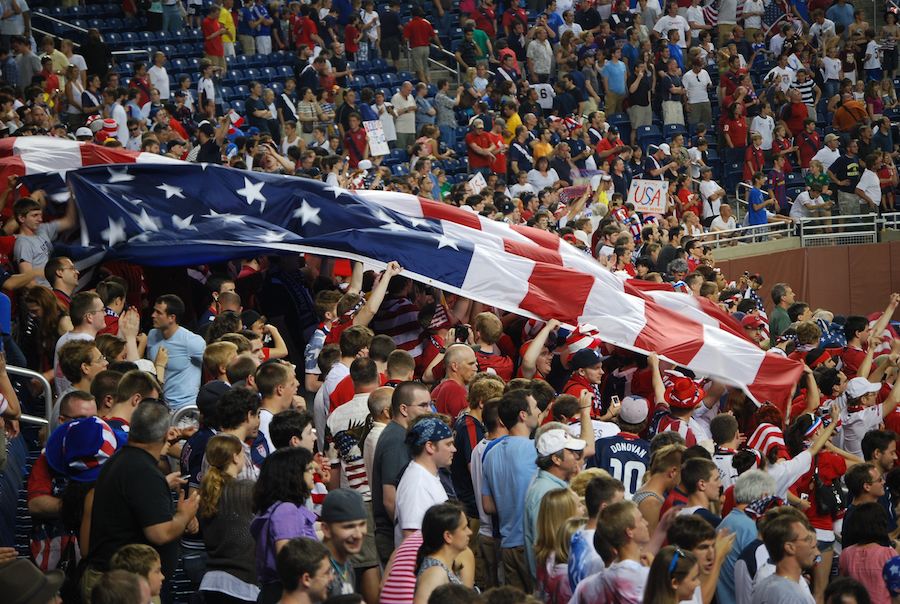
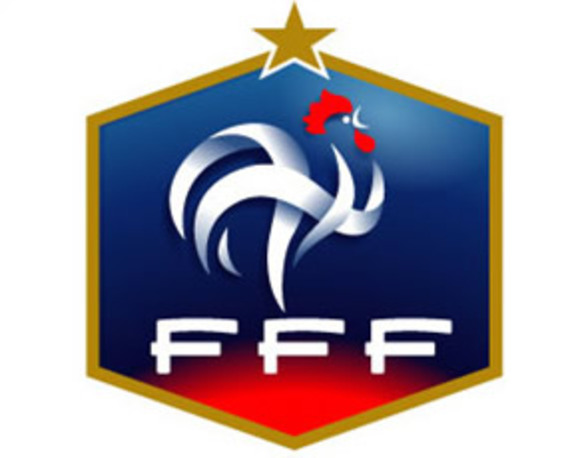
An investigative report by the Mediapart website revealed that numerous managers of the National Technical Directorate (DTN) and the French Football Federation (FFF) approved the “principle of discriminatory quotas” in November 2010. Their objective? To limit the number of players of West African and North African origin.
According to Mediapart, Laurent Blanc — manager of Les Bleus — would have played an active role in those discussions. It is alleged that Blanc highlighted the problem of players who spend three years in training in France and later go abroad to wear other teams’ jerseys. “Something like that cannot not create problems, it applies to the Latin Americans as well,” said Philippe Tournon, press officer of the national team.
At the heart of the problem, the report claims, is growing dissatisfaction among French managers, coaches, and administrators about players who are trained in France, develop into potential national team stars, and who then instead choose — for whatever reason — to represent another country thanks to their double citizenship. “The fact is, there is a large presence of bi-national players at the junior level,” said Fernand Duchaussoy, FFF President, “and some of them later do not want to be part of the national French team.” FIFA rules allow a player with double citizenship to play for a junior national team in one country and still go on to play for another country’s senior national team.
In response to the uproar that followed these revelations, Sports Minister Chantal Jouanno suspended FFF technical director Francois Blaquart, the author of a “quota chart” published on Thursday (May 5) by Mediapart. The explosive issue of racial quotas in French football is embedded in wider debates about immigration, race, and national identity in contemporary France. As Laurent Dubois puts it in Soccer Empire: The World Cup and the Future of France, “When a team takes to the field, the fans say, ‘They are us, and we are them.’ But sometimes that can also force a question: ‘Who are they? And who are we?'”
Football and Politics in Bahrain
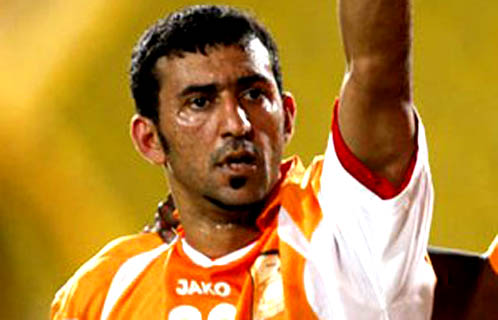
Two of Bahrain’s top footballers, Ala’a Hubail and his brother Mohammed, have been arrested for participating in anti-government demonstrations. “The dismissals are widely believed to have occurred at the behest of the government,” writes James Dorsey over at the mideastsoccer blog. 200 Shi’a sportspeople in the Gulf kingdom have been suspended as the hardline Sunni government continues its repression campaign against the democratic reform movement.
Read the full story here.